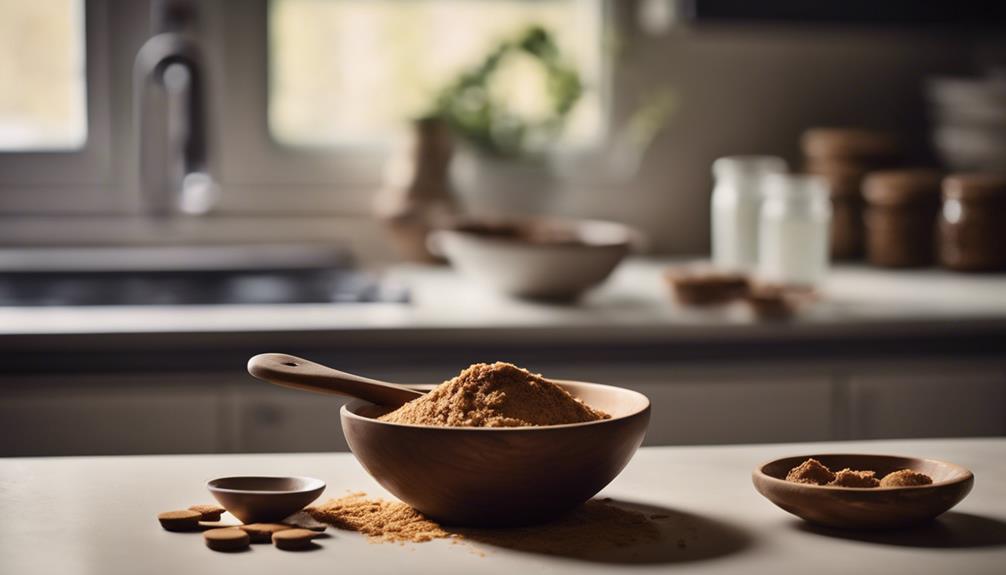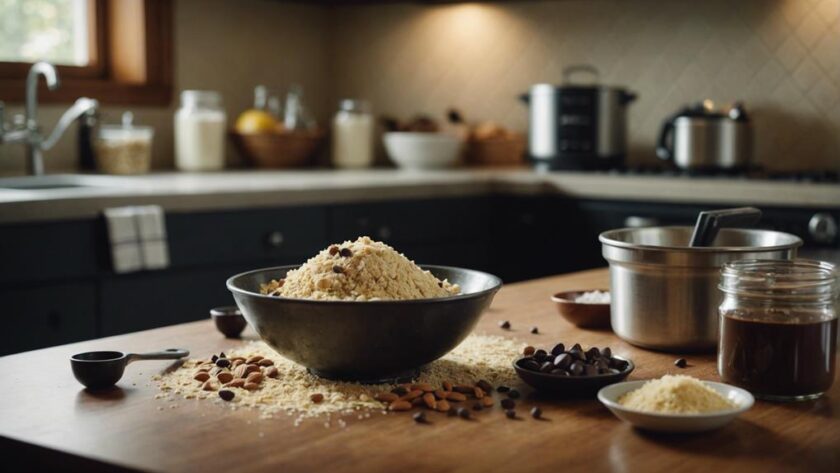Explore low-sugar alternatives like honey, maple syrup, and stevia for healthier cookies. Honey offers a lower glycemic index and antimicrobial benefits. Maple syrup packs antioxidants and various grades for taste and nutrients. Stevia is a zero-calorie delight for diabetics. Dates bring fiber and sweetness, while coconut sugar's low-glycemic qualities shine. Applesauce adds moisture and natural sweetness. Start baking wholesomely with these alternatives and taste the difference.
Benefits of Low-Sugar Alternatives
Opt for low-sugar alternatives in your cookie recipes to prioritize your health goals and reduce sugar intake effectively. By incorporating natural sweeteners like honey or maple syrup, you can create delicious cookies without relying heavily on refined sugars. These low-sugar options offer a tasty way to manage blood sugar levels, making them a suitable choice for individuals with diabetes or those aiming to avoid sugar spikes.
Including fruits such as mashed bananas or applesauce not only adds natural sweetness but also provides moisture to your cookies. This helps in reducing the need for additional sugar while enhancing the flavor profile of your treats. By choosing low-sugar alternatives, you can still indulge in satisfying cookies while aligning with your health and wellness objectives. Make a conscious decision to optimize your recipes with these healthier options to support your overall well-being.
Honey: A Natural Sweetener
Honey, a golden and flavorful natural sweetener, is a versatile ingredient that offers numerous health benefits beyond its delightful taste. This natural sweetener, made by bees from flower nectar, is packed with vitamins, minerals, and antioxidants.
One of the advantages of using honey is its lower glycemic index compared to sugar, leading to a slower increase in blood sugar levels and potentially aiding in weight management. Additionally, honey possesses antimicrobial properties that can support immune function and enhance wound healing when applied topically.
Choosing raw, unprocessed honey is recommended as it retains more beneficial enzymes and nutrients compared to processed varieties. When incorporating honey into recipes as a sugar alternative, remember to use 1/2 to 3/4 cup of honey for every cup of sugar and reduce the liquid in the recipe by 1/4 cup for the best results.
Maple Syrup: A Flavorful Option

When baking healthier cookies, consider using maple syrup as a flavorful sweetener. Its natural antioxidants and lower glycemic index make it a beneficial choice for managing blood sugar levels.
Experiment with different maple syrup varieties and baking techniques for delicious and nutritious treats.
Natural Sweetener Benefits
Choosing maple syrup as a natural sweetener can enhance both the taste and nutritional value of your baked treats. Maple syrup contains antioxidants and essential minerals like zinc and manganese. With a lower glycemic index than refined sugar, it helps regulate blood sugar levels.
The rich flavor profile of maple syrup is a popular choice for enhancing the taste of recipes. It offers a unique combination of sweetness and nutrients, making it a healthier alternative to traditional sugar. By using maple syrup in moderation, you can contribute to a more balanced and wholesome diet while satisfying your sweet cravings.
Incorporating maple syrup into your recipes can be a delicious way to enjoy treats while supporting your overall health.
Maple Syrup Varieties
For those seeking a diverse range of flavors in their baked goods, exploring the various grades of maple syrup can offer a delightful and nuanced taste experience. Maple syrup comes in different grades, with Grade A being lighter and Grade B offering a more robust flavor profile.
The color of maple syrup can vary from golden to dark amber, indicating varying levels of sweetness and flavor intensity. This natural sweetener, derived from the sap of maple trees, not only adds sweetness but also provides antioxidants, vitamins, and minerals like manganese and zinc.
Different regions produce maple syrup with unique taste profiles influenced by factors such as soil composition and climate. Incorporating maple syrup into your recipes can enhance both the taste and nutritional value of your baked treats.
Baking Tips With Maple
To infuse your cookies with a rich and distinctive flavor, consider incorporating maple syrup as a flavorful option in your baking endeavors. Here are some baking tips to make the most of this natural sweetener:
- Healthier Alternative: Use maple syrup as a refined sugar alternative in your cookie recipes for a healthier twist.
- Antioxidants and Minerals: Benefit from the antioxidants and minerals like zinc and manganese present in maple syrup.
- Adjust Liquid: Due to its liquid consistency, remember to reduce the amount of liquid in your recipe when baking with maple syrup.
- Flavor Enhancement: Enjoy the unique and enhanced flavor profile that maple syrup brings to your cookies, elevating traditional recipes to a whole new level of deliciousness.
Stevia: A Zero-Calorie Substitute

Stevia offers you a zero-calorie sweetness that can help you cut down on your sugar intake without sacrificing taste.
For individuals with diabetes, stevia is a beneficial alternative as it doesn't impact blood sugar levels.
When baking with stevia, remember that its sweetness is potent, so only a small amount is needed for the desired flavor.
Stevia's Zero-Calorie Sweetness
With its zero-calorie sweetness and potential health benefits, Stevia stands out as a popular natural sweetener choice for many health-conscious individuals.
Here are some key points to keep in mind about Stevia:
- Stevia is a zero-calorie sweetener, making it a great alternative for those looking to cut down on sugar intake.
- Unlike sugar, Stevia doesn't impact blood sugar levels, making it suitable for diabetics and individuals monitoring their glucose levels.
- Research indicates that Stevia may possess anti-inflammatory and antioxidant properties, offering additional health benefits beyond just sweetness.
- Stevia comes in various forms like liquid drops, powder, and granulated versions, making it versatile for use in different recipes.
Benefits for Diabetics
For diabetics seeking a sugar alternative with zero calories, consider incorporating stevia into your recipes for a healthier sweet option. Stevia is a zero-calorie sweetener with a glycemic index of zero, making it diabetic-friendly as it doesn't raise blood sugar levels.
Its intense sweetness means you only need a small amount to sweeten your treats adequately. Research indicates that stevia may aid in lowering blood sugar levels and enhancing insulin sensitivity in individuals with diabetes.
Baking With Stevia
Consider swapping out traditional sugar for the natural, zero-calorie sweetener Stevia in your baking recipes to cut down on sugar intake while maintaining sweetness. When baking with Stevia:
- Stevia's Origin: Derived from the Stevia rebaudiana plant, Stevia is a natural, zero-calorie sweetener.
- Sweetness Concentration: It's much sweeter than sugar, so you only need a small amount for baking recipes.
- Reduced Sugar Intake: Using Stevia can help reduce sugar intake without compromising on sweetness.
- Calorie-Free Option: Baking with Stevia is ideal for those seeking a low-sugar alternative that provides sweetness without the added calories. Adjust the amount used to suit your taste preference, as Stevia may have a slight aftertaste for some individuals.
Applesauce: A Moisturizing Ingredient

Adding applesauce to your cookie recipes not only boosts their moisture content but also provides a healthier alternative to traditional ingredients like butter. Applesauce serves as a fantastic butter substitute, greatly reducing the saturated fat content in your baked goods. Its high moisture content guarantees that your cookies remain soft and chewy, enhancing the overall texture of the treat.
By incorporating unsweetened applesauce into your recipes, you can lower the calorie and sugar content, making your cookies a more nutritious option. Additionally, the natural sweetness of applesauce adds a subtle and delightful flavor enhancement to your baked goods. When baking with applesauce, opt for unsweetened varieties to avoid the added sugars commonly present in pre-sweetened versions.
Experiment with different amounts to find the perfect balance for your low-sugar treats while enjoying the benefits of this versatile and healthy ingredient.
Dates: A Nutrient-Rich Sweetener
Dates, rich in essential nutrients like fiber, potassium, and antioxidants, serve as a natural sweetener offering a healthier alternative to refined sugar. Here are some reasons why dates are a great choice for sweetening your recipes:
- Lower Glycemic Index: Dates have a lower glycemic index compared to refined sugar, making them a better option for those looking to manage their blood sugar levels.
- Nutrient-Rich: In addition to their sweetening properties, dates are packed with essential nutrients that can benefit your overall health.
- Caramel-Like Sweetness: Dates can add a delightful caramel-like sweetness to your dishes, enhancing the flavor profile without the need for additional sugars.
- Moisture and Subtle Sweetness: When used in baking, dates not only contribute subtle sweetness but also help retain moisture, resulting in a soft and flavorful end product.
Coconut Sugar: A Low-Glycemic Option

Derived from the sap of coconut palm trees, coconut sugar is a low-glycemic option that offers a healthier alternative to regular sugar. With its lower glycemic index, coconut sugar has a slower impact on blood sugar levels compared to refined sugar, making it an important choice for those looking to manage their blood sugar levels.
Additionally, coconut sugar retains essential nutrients like iron, zinc, calcium, and potassium, unlike its highly processed counterpart. Its caramel-like flavor profile makes it a versatile substitute in baking and cooking, adding a unique taste to various dishes.
While considered a healthier alternative, moderation is still vital due to its similar calorie content to regular sugar. So, enjoy the benefits of coconut sugar, but remember to use it in moderation to maintain a balanced diet and overall health.
Conclusion
So next time you're craving a sweet treat, try using these low-sugar alternatives in your cookie recipes.
Did you know that reducing sugar intake can lower your risk of developing chronic diseases like diabetes and heart disease?
Making small changes in your diet can have a big impact on your overall health.
Give these healthier options a try and indulge guilt-free in delicious cookies. Your body will thank you!





